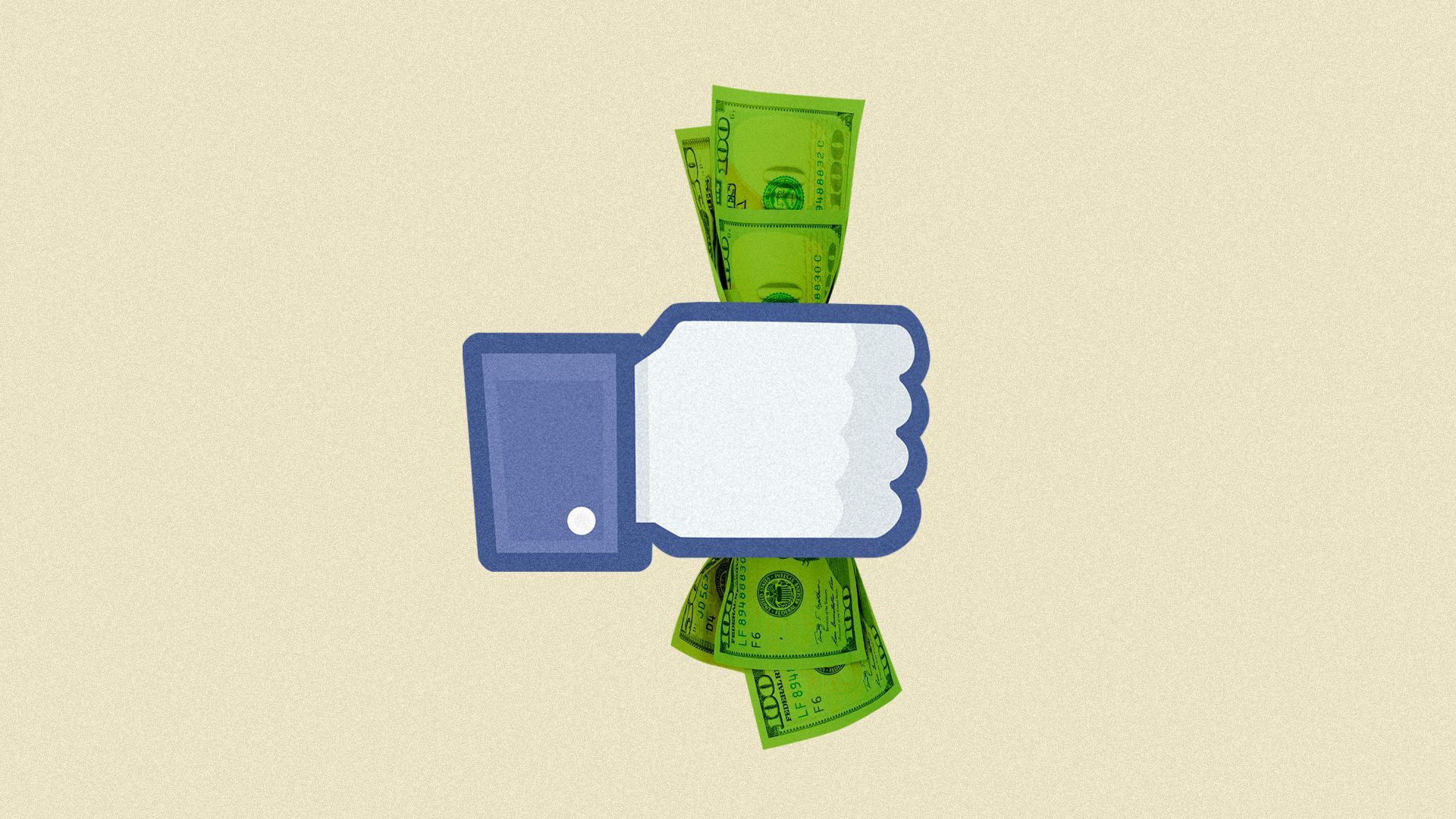Facebook faces trust crisis as ad boycott grows
Add Axios as your preferred source to
see more of our stories on Google.

Illustration: Aïda Amer/Axios
What started out as a few whispers about advertisers pulling Facebook ads has turned into a growing boycott of the social network over its content moderation policies — a situation the company is now describing as a "trust deficit."
Why it matters: Given Facebook's size, the boycott likely won't hurt the company's bottom line in the short term, but it turns up the political pressure on Facebook ahead of the 2020 election and underscores the company's challenges managing its public image.
Driving the news: Verizon said Thursday it will pull advertisements from Facebook and Instagram until the company “can create an acceptable solution that makes us comfortable." It's likely the largest brand to pull ads from the company to-date.
Context: In a call with over 200 advertisers Tuesday before Verizon's move, Facebook’s head of trust and safety policy Neil Potts "acknowledged that the company suffered from a trust deficit," according to the Financial Times. A source familiar with the meeting confirmed the comment.
- The conversation occurred amid a growing boycott of Facebook and Facebook-owned Instagram's ad platform by roughly a dozen brands.
- After a handful of outdoor companies like North Face, REI and Patagonia said they would stop advertising on Facebook and Instagram last week, several other advertisers have joined the movement, including Ben & Jerry's, Eileen Fisher, Eddie Bauer, Magnolia Pictures, Upwork, HigherRing, Dashlane, TalkSpace and Arc’teryx.
Heavyweights in the ad industry have also begun pressing marketers to pull their dollars.
- On Tuesday, Marc Pritchard, chief brand officer at Procter & Gamble, one of the largest advertisers in the country, threatened to pull spending if platforms didn't take "appropriate systemic action" to address hate speech.
- In an email to clients obtained by the Wall Street Journal last Friday, 360i, a digital-ad agency owned by global ad holding group Dentsu Group Inc., urged its clients to support the ad boycott being advocated by civil rights groups.
Yes, but: Procter & Gamble and other leading marketers make these types of broad-based threats regularly to pressure tech companies to do better at everything from content moderation to ad measurement.
- Facebook's current crisis resembles YouTube's ad boycott in 2018 over its content moderation policies. After roughly a year, many of the advertisers that boycotted the company, including big names like Procter & Gamble, had returned.
- And YouTube, whose owner Google broke out its ad revenue for the first time in February, is still an advertising powerhouse, bringing in roughly $15 billion annually.
Our thought bubble: Facebook's ad platform is still so powerful that it will be hard to get a huge coalition to boycott the brand for an extended period of time.
- But the boycotts are still a public relations problem for Facebook, which could use all of the industry support it can get leading up to the election.
What they're saying: Facebook's VP of Global Marketing Solutions Carolyn Everson said in a statement to Axios last week, "We deeply respect any brand’s decision and remain focused on the important work of removing hate speech and providing critical voting information. Our conversations with marketers and civil rights organizations are about how, together, we can be a force for good."
The big picture: The boycotts are a result of pent-up frustration from lawmakers and marketers over Facebook's content moderation policies, which many feel don't go far enough in helping to curb hate speech and harmful content online.
- That frustration reached a tipping point during the recent Black Lives Matter protests, as Facebook refused to fact check or moderate posts from President Trump that many argued incited violence against protestors.
Facebook is facing pressure on both sides of the aisle. Democrats, including Presidential nominee Joe Biden, say Facebook doesn't go far enough to filter hate speech and misinformation. Republicans, including President Trump, say its speech limits go too far and intentionally censor conservatives.
- Still, like corporate marketers, political candidates — including both major presidential campaigns — are not ramping down their Facebook spending ahead of the election.
- Some White House officials wanted to ban most government social media advertising as part of Trump's recent executive order on social media, according to a Politico report. The idea was eventually dropped "over concerns that it wouldn’t stand up to legal challenges."
The bottom line: The political and social pressure on Facebook is ramping up, but the tech giant doesn't show any signs of seriously changing its policies in response to the mounting pressure, as most politicians and marketers seem to benefit too much from Facebook advertising to really give it up long-term.
